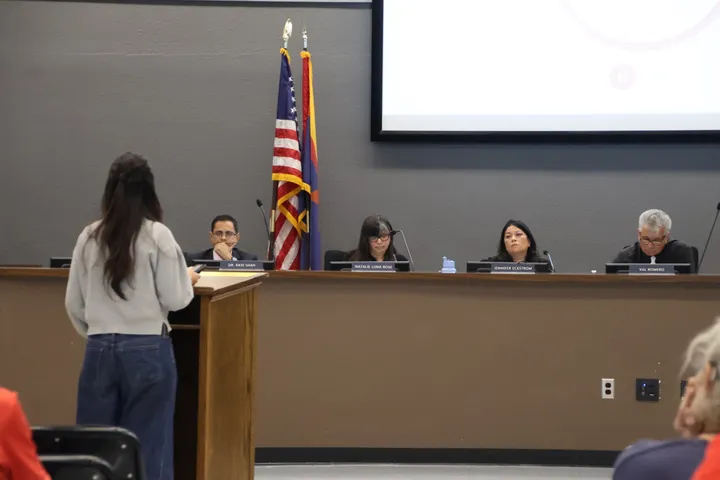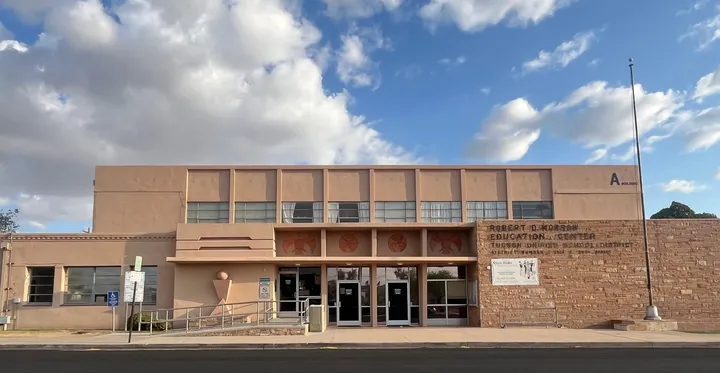UA holds off on federal compact
The UA will not sign the Higher Education Compact, instead submitting a “Statement of Principles” outlining its commitment to academic freedom, merit-based research and institutional independence.
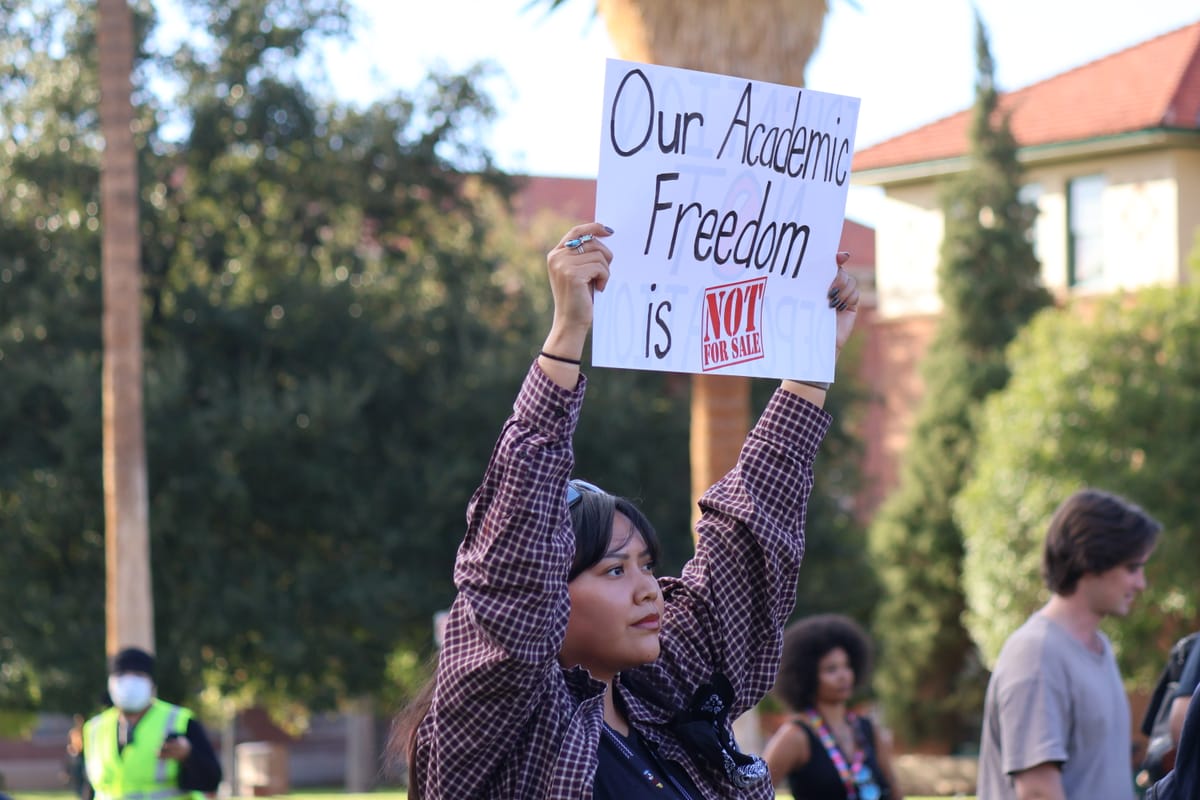
After weeks of campus protests urging the University of Arizona to reject the Trump administration’s proposed Higher Education Compact, the university announced Monday that it will not sign the agreement, instead submitting a “Statement of Principles” to the U.S. Department of Education.
The compact would tie university funding to new compliance rules, such as tuition freezes, restrictions on race and sex considerations, and limits on international enrollment, raising concerns about academic freedom and institutional independence.
UA was one of nine universities invited Oct. 1 to give feedback on the draft. School officials said the proposal sparked wide discussion on campus and nationally and that federal representatives indicated they were seeking dialogue rather than a definitive written acceptance.
Since receiving the draft, UA leaders consulted with the Arizona Board of Regents, faculty, staff, students, shared-governance groups, alumni and elected officials, according to a Monday update from President Suresh Garimella’s office.
While some recommendations “deserve thoughtful consideration,” the update said core principles, including academic freedom, merit-based research funding and institutional independence, must be preserved.
Officials said the statement reflects feedback from hundreds of stakeholders and is intended to contribute to the broader debate over the relationship between universities and the federal government. UA said it will continue working with other institutions, associations, and state and federal leaders as the discussion evolves.
The four-page statement emphasizes nondiscrimination in admissions and hiring, free expression, financial responsibility, and lawful engagement in international research and enrollment. It commits to keeping tuition affordable, ensuring transparency, and maintaining compliance with federal laws while fostering a campus culture of civil discourse and open inquiry.
The statement was accompanied by a letter to Education Secretary Linda McMahon, in which Garimella said the school shares the goal of strengthening higher education but stressed that research funding must remain merit-based and institutions must stay independent.
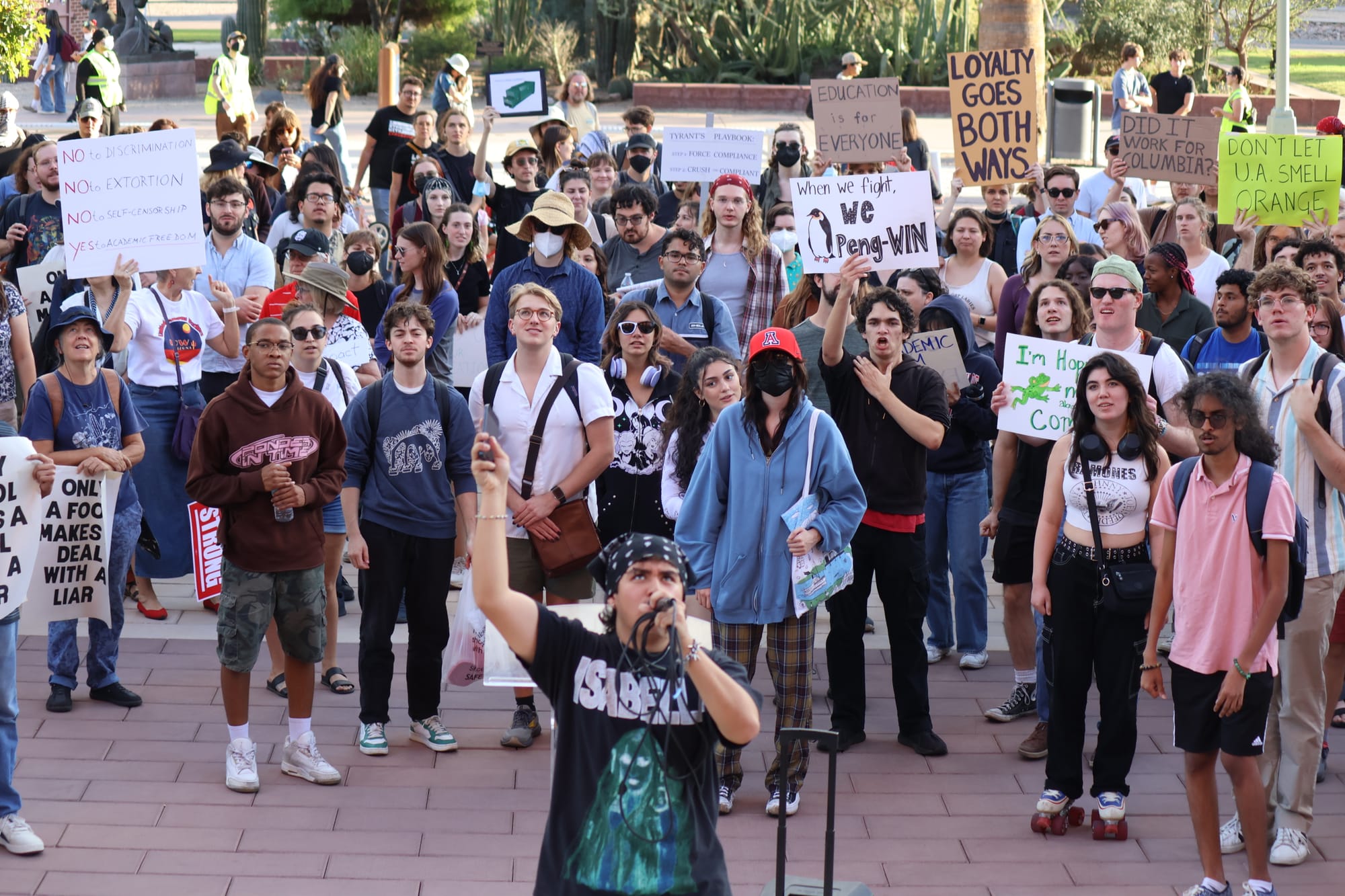
He cited UA’s recent cost cuts and tuition freeze as examples of reform and said the Statement of Principles affirms the university’s commitment to academic freedom, transparency and collaboration with the federal government.
Garimella’s letter does not explicitly accept or reject the compact, instead presenting the Statement of Principles as its formal response.
“I look forward to further discussion and a continued partnership with the federal government, which has helped to produce the strongest and most competitive higher education system in the world,” Garimella said in the letter.
The UA’s response follows weeks of action on campus, including a Friday protest that saw more than 100 students, faculty and community members gather outside Old Main.
The protest came on the heels of a Friday conference call with the White House and representatives from universities that have not publicly accepted or rejected the compact, including UA, Vanderbilt University, the University of Texas at Austin and the University of Virginia, among others.
That same afternoon, the Arizona Board of Regents held a private executive meeting with Garimella regarding the compact, which resulted in no immediate action.
“This compact is a serious assault on academic freedom, on our constitutional rights to teach in the classroom what we have been hired to do,” said Daniela Triadan, a tenured professor in the School of Anthropology who has been teaching at the university for 25 years.
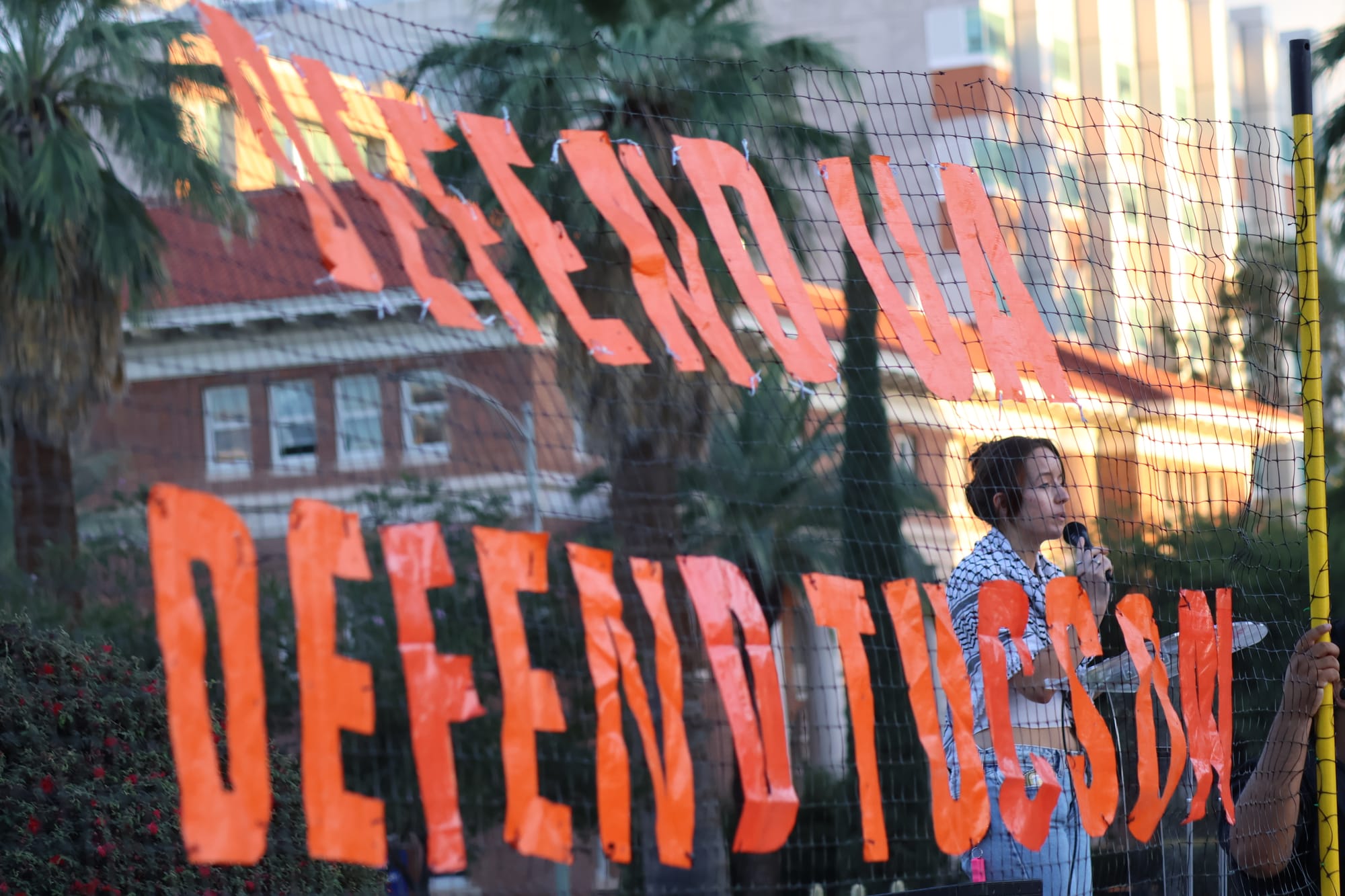
Triadan said the UA has been ranked as the best public university in the Southwest, a distinction that could change if the school agreed to the compact’s terms.
“We are losing integrity. We’re losing independence as an institution to make decisions that are research-driven, innovation-driven, community-, necessity-driven if we’re signing on to this compact,” she said.
Lauren Tomalelli, a Ph.D. student in the School of Anthropology’s Mediterranean archaeology program, said her program could be defunded if it failed to align with the compact’s stipulations.
“If we become a place that does not allow merit-based scholarship and instead goes on defunding scholarship that doesn’t fit with an administration’s initiative, I think we devalue ourselves as a research institution, and that’s the exact opposite of what we should be doing in a financial crisis,” she said.
Brandon Rogers, president of the Black Student Union, said he fears the compact’s censure of language considered to be related to DEI could affect organizations such as his, just as it has the university’s cultural centers.
The union is one of 18 student organizations that organized Friday’s protest.
“This is our campus, and we are out here to protect what makes our campus beautiful and unique, and that is not that compact,” Rogers said.
The group marched from Old Main to the university’s administration building, chanting, “We want justice, you say how? Hands off our students now!”
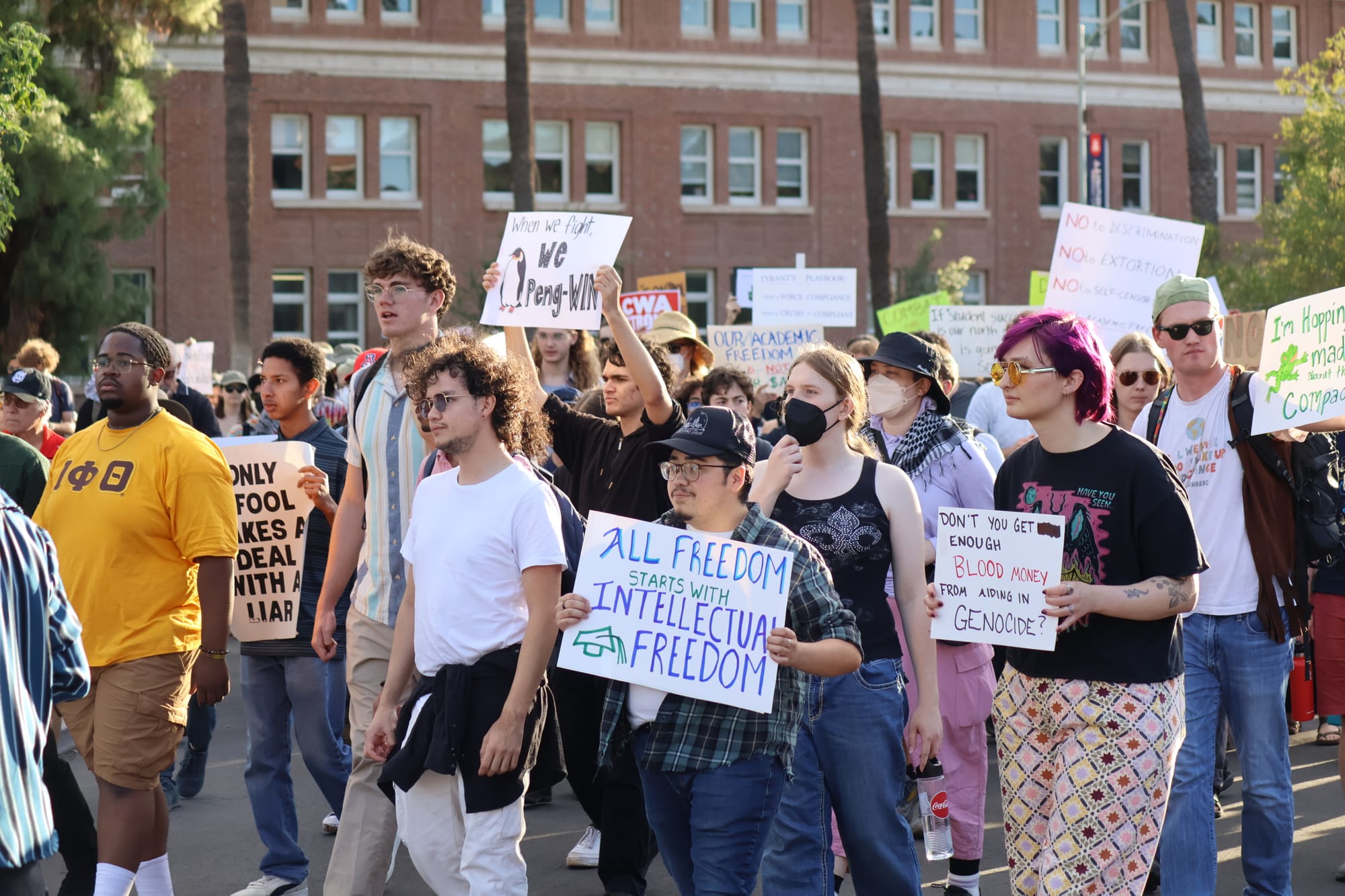
Miranda Lopez, southern regional director of the American Student Association, said student organizations and governments have been barred from attending administrative meetings regarding the compact, despite the fact that it would directly affect students.
“Garimella and ABOR are talking about whether they want to consider agreeing to this compact, and we aren’t allowed in the meetings,” Lopez said. “We need more transparency. We need measures that will support students and workers, and we need shared governance. We need the state to step up to not only fund higher education but to protect higher education.”
Benjamin Huffman, ASUA’s executive vice president, said he has been actively listening to students’ concerns about the compact.
“There’s more that this university needs to do. Some students believe our university needs to change. We do need to solve some of these issues," Huffman said. “This compact doesn’t do that. Let’s address the problems, but not the way that they’re outlined.”
A faculty member who chose not to disclose his name expressed concern about how the compact directly impacts historically marginalized students.
“I fundamentally feel like this is a threat to everybody at the university, no matter who they are or how they might identify, but there’s definitely particular groups that are especially vulnerable,” they said. “With the consolidation, basically the shutdown, of the cultural centers, those places are essential spaces for students, especially those who may not feel otherwise represented on campus.”
Ezri Alfie, a graduate student and member of UA Resist, said students deserve a democratic educational space. UA Resist is made up of students, staff and community members opposing university decisions they believe do not prioritize students’ needs.
“When this administration comes for immigrants, when they come for international students, when they come for Black people, it is our job to connect struggles and recognize that if they aren’t coming for me today because of my silence, they will come for me tomorrow,” Alfie said. “We deserve … an education that’s accessible and free, a sanctuary campus with no police, and cultural resource centers that are restored with full funding.”
Topacio “Topaz” Servellon is a reporter with Tucson Spotlight. Contact them at topacioserve@gmail.com.
Tucson Spotlight is a community-based newsroom that provides paid opportunities for students and rising journalists in Southern Arizona. Please consider supporting our work with a tax-deductible donation.


